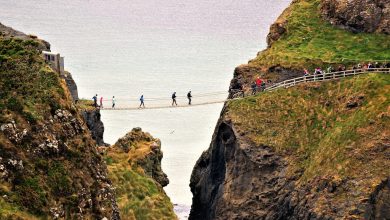Temporal Disconnect: An Underwater Oceanographic Institute?
I was walking along the beach today in Woods Hole here on Cape Cod. I wanted some fresh air and felt like collecting some seashells. You can always find the best seashells in the winter. There’s no one else on the beach, usually, so the biggest, most beautiful seashells will just be waiting for you there on the sand, perhaps tangled in some seaweed. As I walked the beach and looked for shells, I thought about how in the next century or two– at most– all of Cape Cod will be underwater.
I find it somewhat ironic that Woods Hole Oceanographic Institution– one of the leading research institutions studying climate change– will be one of the first places to go underwater once sea level begins to rise, as it will gradually over the next hundred years or so. The institution is built on the low-level glacial till of Cape Cod, and most of the scientists have offices with an ocean view. In the summer the scientists and graduate students often go down to the beach for a quick swim. Building an oceanographic instituion on the ocean makes sense, but if Woods Hole were smart they’d begin investing in some property in the hills of New Hampshire. Why? Because that’s where the new ocean will be not so long from now.
The scientists here at Woods Hole are very environmentally aware. The scientific parking lot is cluttered with bicycles and compact hybrid cars, a great contrast to the Land Rovers and SUVs that fill the nearby Martha’s Vineyard Ferry parking lot. Most people you encounter here acknowledge that climate change is occurring and that sea level will rise in the near future.
Almost everyone here would agree that Cape Cod will be one of the first places to go underwater when sea level does rise. However, no one seems to worry about the location of the oceanographic institution. At least, they don’t worry about it on a day-to-day basis. The scientists take their lunchtime strolls along the beach and play with their expensive mass spectrometers and PCR machines in their multi-million dollar labs. No one seems too worried about having to move all of these fancy labs and scientific equipment once sea level rises.
I am sure that at times Woods Hole scientists must wonder about what will happen to the oceanographic institution once Cape Cod is underwater. Yet, it is difficult to really worry about the institution on a day-to-day basis, even for those scientists who are actively studying climate change. I’ll speak now for myself: while I intellectually recognize that the sea is rising– and rising fast– I cannot wrap my mind around the effect of sea level rise on my own life. When I look at the ocean, I don’t see it rising. One day’s ocean does not appear different from the next day’s. Sea level rise occurs fast on the geologic timescale but still occurs quite slowly on the human timescale.
Human minds did not evolve to think on geologic scales. We are very well-adapted to thinking on the scales– both physical and temporal– that apply to our own short lives. If one cannot actually see the sea rising or anticipate it rising significantly within their own lifetime, it is difficult to become alarmed. One may have minor concern for one’s descendents, but that gut reaction of “wow! the sea is rising, so I’d better run away” just doesn’t happen for something that rises on the order of millimeters per day. You just can’t see the change occuring nor anticipate its immediate affects on your life.
Honestly, I think this is why the issue of sea level rise and climate change is so difficult for many people– myself included– to become worked up about. I am a first-year graduate student now in the program at Woods Hole. I will graduate in four to five years. Very likely, Woods Hole will not be underwater in five years. After I graduate, who knows where I may end up? So, I find it challenging to become concerned about sea level rise here on Cape Cod, at least in my daily life and routine. Once the waters are lapping at my office door, then I’ll become alarmed.





Ah, but when Cape Cod is underwater, we can convert the Woods Hole installation into a supervillain lair like Stromberg had in The Spy Who Loved Me.
(This is the sound of me desperately trying to find the best in a bad situation.)
I suspect that on the timescale at which sea-level rise will actually threaten Woods Hole, those expensive mass specs and other equipment will actually be considered outdated scrap (after all, they'll probably be a decade or two old at least). So it's just the buildings themselves that will have to be relocated or replaced.
Like Blake Stacey, I too would consider an underwater oceanographic institute to be much more … sensible, than an above water one.
Of course, technology has, at the moment, not evolved far enough to the point where this can be accomplished cost-effectively, and safely. But how far away is that point? Anything you could build on the Moon or Mars, you could also build on the sea floor I'm sure. In fact, getting all the equipment there would be a lot easier. You'd just have to sink it and let gravity take care of it, rather than fighting against gravity and blasting it into orbit and beyond.
I'm also curious about floating habitats. If sea levels rising will reclaim such a large chuck of land, we'll eventually be forced to move out onto the surface of the oceans.
Being the adventurous type myself, I could imagine living in either of those environments. However, I would prefer to have those without the pressure of global warming forcing our hands into eventually creating them :?
Well, perhaps it has something to do with California, but my wife and I considered the effects of tidal waves and global warming when we bought our home in Southern California. We are high on a hill (500' above sea level) and in an area that sits on bedrock with excellent drainage facilities.
Here in SoCal we see the effects of the ocean reclaiming the land every day as multi-million dollar mansions have their fragile foundations eroded. I'm sure that Woods Hole will simply relocate and turn the existing site into a tourist facility or somesuch.
I live in Gauteng, South Africa, that is about 1600 km (1 mile) above sea level. To wrap my mine around the idea of cities getting lost underwater is really strange.
1600 kilometers is about 1000 miles. I think that would put you somewhere in low earth orbit.
I think your elevation is about 1600 meters ;)
Hey, here in New Orleans, we're already below sea level! That's why more than 1100 people died when a levee was breached. So I think I can make myself a little concerned about rising sea levels. Mardi Gras helps one forget, though. ;)
exarch you are right, only about 1.6 km
Well, now we can stop worrying about the future, because Neil Gaiman has just given us a fantastic instrument of divination. Let me ask the Magic Neil-ball whether Woods Hole Oceanographic Institute should be moved to higher ground. First answer:
Shaking again, I get:
Doesn't that just about say it all?